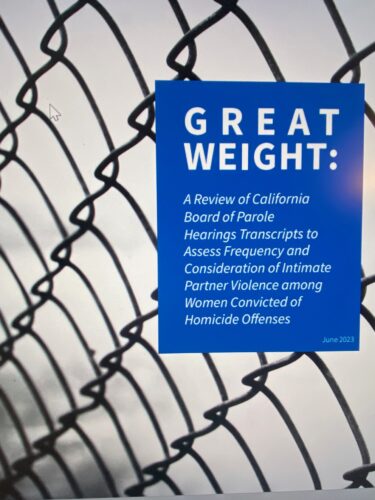Criminal Justice Center Report Spurs Quick Action by California Parole Board
‘Great Weight’ Analyzes How Female Survivors of Intimate Partner Violence Are Further Victimized by the Criminal Legal System
Many students work on important law and policy projects while at Stanford Law School. But the wheels of policy change typically grind slowly and it is rare to see immediate results spring from their research and reports. It is rarer still for an agency that comes under examination in a policy report to not only be receptive to the findings, but also take immediate action.

But that’s what happened with the June 2023 release of the Stanford Criminal Justice Center’s report, “Great Weight: A Review of California Board of Parole Hearings Transcripts to Assess Frequency and Consideration of Intimate Partner Violence Among Women Convicted of Homicide Offenses.” The report—the result of SLS students’ systematic review of 140 parole hearing transcripts provided by the California Board of Parole Hearings (BPH) —examines the frequency with which intimate partner violence (IPV) contributes to the incarceration of women for murder or manslaughter convictions, and how those women fare in the parole process.
Under the direction of Stanford Criminal Justice Center Executive Director Debbie Mukamal, 14 students researched and wrote Great Weight as part of a Spring 2022 policy practicum, Creating a National Census of Women Imprisoned for Murdering their Abusers. Students Lauren Courtney, Jamie Halper, Hayden Henderson, Kara Salovaara, and Emily Vaughan (all JD ’24) took principal responsibility for drafting the report. Other students coded reams of data gleaned from parole hearing transcripts. According to Mukamal, the hearing transcripts provided a useful tool to analyze the appearance of IPV as a contributing factor to incarceration, as most individuals convicted of murder and manslaughter in California appear in front of BPH to determine suitability for parole release, and discussion of the individual’s background and circumstances of the crime are ordinarily included in the transcripts.
Shortly after the report’s release, Jennifer Shaffer, the Executive Officer for BPH, invited Mukamal and Courtney to Sacramento on October 19, 2023 to present the findings to the BPH Commissioners and staff members at their annual training. The invitation advanced one of the key recommendations in the report: the need to provide BPH with additional and ongoing training on intimate partner violence and the impacts of trauma for BPH commissioners and staff in an effort to strengthen the parole process. Following the presentation, the BPH heard from two expert forensic psychologists on intimate partner violence and interviewing techniques. Soon after the presentation, the Chief Psychologist for BPH requested a dedicated briefing for its Forensic Assessment Division psychologists.
Among its conclusions, Great Weight found that BPH panels on occasion consider a survivor’s experience of IPV as evidence of an “unstable social history” in ways that undermine the aim and purpose of the Structured Decision Making Framework BPH uses to assess a person’s current risk of dangerousness. The report argues that this treatment of intimate partner violence is untethered from existing literature about risk assessment and IPV victimization. In addition, the review of survivors’ hearing transcripts found that BPH panels sometimes view survivors’ discussion of their IPV victimization as an effort to “shift blame” from themselves. The report contends that this type of reasoning seemingly contradicts state law that expressly prohibits BPH commissioners from using a survivor’s discussion of intimate partner violence to “support a finding that the survivor lacks insight into his or her crimes and its causes.” The transcripts also revealed that some hearing panels appeared to rely on outdated myths about intimate partner violence, including skepticism towards survivors whose claims did not involve physical violence and a failure to recognize that a survivor could both be a victim and the perpetrator of the crime.

Mukamal says the publication of the report and the resulting presentation to BPH have been extremely gratifying. “This work brings together everything a research center based at a law school can and should be doing,” she says. “We are attempting to move public policy forward in a concrete way, in an area that is under-studied, for a population that is in acute need of having its issues amplified. Plus, this project offers our students experience and skills that will make them better attorneys and stronger advocates.”
Through their review of the transcripts provided by BPH, the student researchers found that approximately 23 percent of women incarcerated for homicide in California are serving time for a crime directly linked to their experience of intimate partner violence. These survivors experience a parole grant rate nearly equivalent to that of the general prison population. They are, on average, serving over two decades in prison before being found suitable for parole. The transcript review also revealed that more than 90 percent of survivors incarcerated for intimate partner-related homicides had experienced other forms of trauma—such as child abuse or sexual violence—prior to their incarceration.
“The parole process is a challenging and emotional one for any incarcerated person, but is uniquely challenging for criminalized survivors,” says Courtney, the student who co-presented with Mukamal in Sacramento and who worked with survivors of intimate partner violence prior to starting law school. “I am grateful to have had the opportunity to present this important research to those who are singularly positioned to make the process better for survivors of intimate partner violence, the commissioners themselves. Throughout this project, we have received critical support and access from BPH leadership. It is their openness and collaboration that made this important work possible.”
In addition to providing additional and ongoing training to parole commissioners on the nature of intimate partner violence, the report recommends allowing formerly incarcerated survivors of intimate partner violence a greater voice in the parole process.
The report also encourages future research on a range of topics, including: the relationship between intimate partner violence and traumatic brain injury; how sentencing enhancements might disproportionately impact women; the role of formal intimate partner violence investigations in the parole process; the prevalence of previous sexual trauma among intimate partner violence survivors; and the role of District Attorneys in parole suitability hearings.
This study builds on the work the Stanford Criminal Justice Center is leading as part of the Regilla Project, a national research project focused on women who are incarcerated for homicide convictions stemming from intimate partner violence. During Fall 2023 Mukamal and Sklansky are teaching a Policy Practicum in which law students are analyzing data collected in July 2023 from 480 individuals incarcerated at Central California Women’s Facility for murder and manslaughter convictions.
